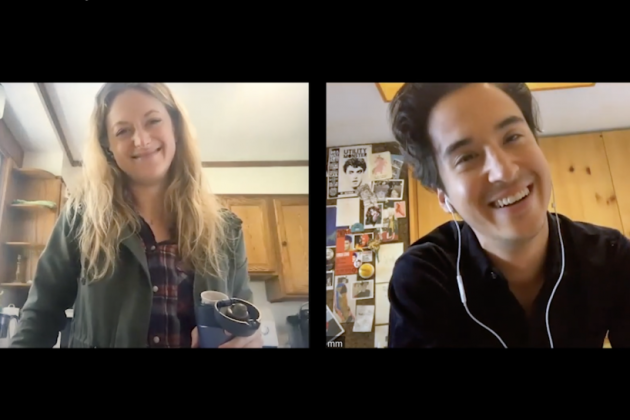NewFest Film Festival: Ryan Spahn on Shooting His Play on Zoom

As an openly gay actor, Ryan Spahn was determined to tell his story. “Nora Highland” was originally developed to be an Off-Broadway play, but when the pandemic forced a shutdown, Spahn had to rethink. The story explores the casting process surrounding an iconic gay character in a new Broadway revival.
A fundraising event with actors Michael Urie and Tessa Thompson involved a reading, and prompted Spahn to consider Zoom. In the end, Spahn turned director and cinematographer as he filmed his production via Zoom. “I was directing the actors from my apartment via Zoom into their homes. Nobody interacted in-person. The actors had to do their own lights, microphones, set decorating, costumes, props, meals, etc. They had to be super game for it,” Spahn says.
He adds shooting online meant “safety, with regards to Covid-19 and the pandemic, was not something we had to deal with.”
The film will now get a digital release, premiering Oct. 26 at the Newfest NY LGBTQ Film Festival.
Spahn talks with Variety below about releasing his film this way:
How were you connected to the original material (play), and what was it that interested you in adapting it for the screen?
The subject matter of “Nora Highland” is very important to me, and I wanted to seize the opportunity to make it into a film. I am an openly gay actor. I have faced tremendous setbacks because of this. Ideally, any actor should be allowed to play any role. That’s why actors get into acting. But, as of 2020, straight actors are the only actors allowed to do that. Queer actors pretty much only get to play queer. There are exceptions, but they are rare. The industry has positioned us this way. And now, with the stigma for playing queer thankfully being lifted, the flip side of that is that straight actors are swooping in and taking the queer roles as well, leaving us high and dry.
What were the original plans for the film (distribution) and how did that change?
The original plan for “Nora Highland” was to find an off-Broadway theater to produce the play. It’s never had a production. But, in mid-March, the entire theater community was shut down indefinitely. It was shattering. In every sense. All I can equate it to is what it must feel like for an ice skater to twist an ankle or a runner to tear a meniscus. I had no other option but to change.
How did you pivot to shooting in a pandemic?
“Nora Highland” is based on my play, which was presented on Zoom early in the pandemic as a fundraising event for Play-PerView. The online reading starred Tessa Thompson and Michael Urie. After watching that, I became aware of how well the material worked in the video-conferencing format. It felt almost intentional. Most things that are presented digitally these days, things that weren’t intended to be presented digitally, don’t really work. I felt the opposite was true here. I knew I had to pivot to adapting my play into a film and shoot it during quarantine. “Nora Highland” plays in the vein of films such as “Unfriended” and “Searching.”
What were the challenges in terms of not sacrificing on quality?
The film was shot entirely on Zoom. Most of the actors have never met each other in-person. Some were based in New York, one was in L.A., and one was in London. Time zones were definitely stressful for rehearsals and filming. The hardest part of the actual shoot was how dependent we were on people’s internet connections. There’s a scene that I wanted to be filmed as a 45 minute, single take. The only way that would work is if everyone’s internet connections held up. Thankfully, they did.
What is it like to be releasing the film this way and virtually?
“Nora Highland” made its world premiere digitally on Monday at NewFest: New York’s LGBT Film Festival. It’s exciting to be a part of an online film festival. I’m able to watch tons of films, perhaps more than I would’ve seen in-person. I’m connecting with filmmakers from all over the world on social media and sharing the love I had for their work. I’m watching virtual Q&A’s, many of which might not have occurred if they were in-person. It feels very special. Also, my film has a chance to reach a larger audience this way.
Are you planning to continue producing work that is virtual/within this space? Do you think live streams or zoom is a workable space for theater?
I think there’s a lot that will continue to happen in the virtual space once the pandemic is under control. I’m going to be a part of an upcoming CBS Spectrum series that’s shot practically and remotely. I think people are learning how to make lemonade out of lemons, which is really important for survival. As for live theater, which is deeply missed, I believe the next step is for plays to be performed on a stage in an empty theater with cameras all around. No live audience. The nightly performances can be live-streamed to a digital audience. They had tremendous success with this model at the Old Vic in London, and Actor’s Equity needs to approve contracts for this here in the States. It will marry the sensation of live performance with the digital era. The thrill will be resurrected.
More from Variety
How 'Grey's Anatomy' Revolutionized Pop Culture -- and Why It's Not Done Yet
'Ellen' Show to Bring Back Live Studio Audiences With COVID-19 Guidelines in Place
CBS Shortens Series Orders for 2020-21 Season Due to COVID-19
Best of Variety
Sign up for Variety’s Newsletter. For the latest news, follow us on Facebook, Twitter, and Instagram.

 Yahoo News
Yahoo News 